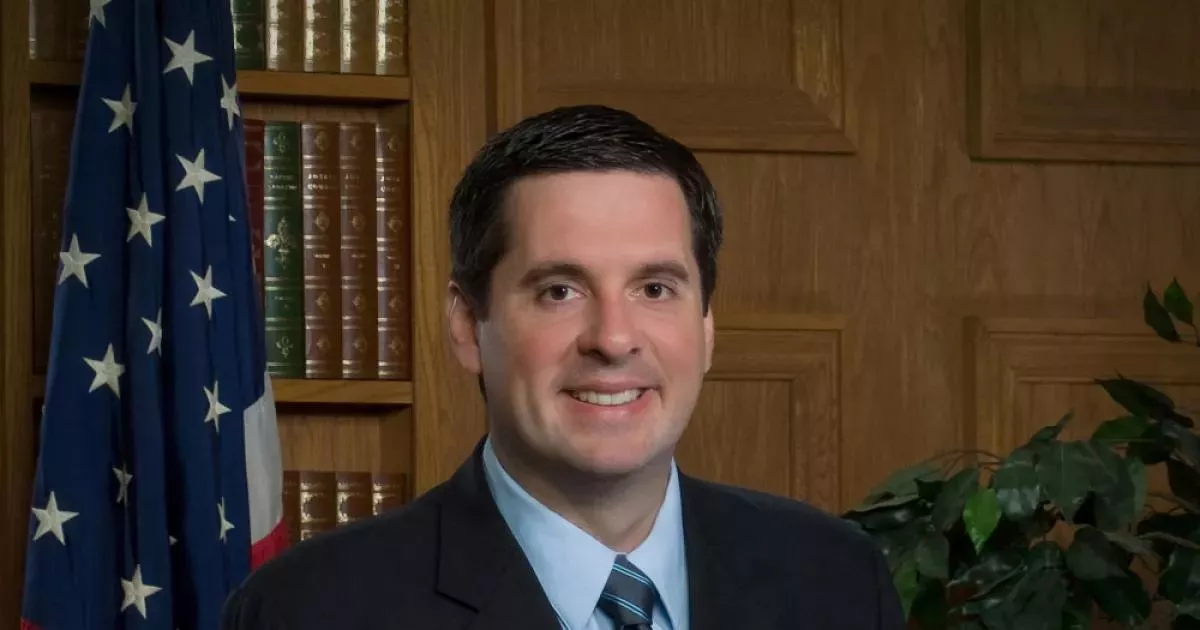Devin Gerald Nunes is an American businessman and politician. He served as a U.S. Representative for California, first in the 21st congressional district (2003-2013) and then in the 22nd district (2013-2022), before resigning to become CEO of the Trump Media & Technology Group (TMTG).
1951: Publication of "Home Is An Island"
In 1951, the novel "Home Is An Island," for which Devin Nunes would later write a foreword, was originally published.
October 1, 1973: Devin Nunes is Born
Devin Gerald Nunes was born on October 1, 1973.
1973: Endangered Species Act Passed
The Endangered Species Act was enacted in 1973.
1993: Nunes Receives Associate of Arts Degree
Devin Nunes earned his Associate of Arts degree from the College of the Sequoias in 1993.
1995: Nunes Earns Bachelor's Degree
Devin Nunes graduated from Cal Poly San Luis Obispo with a bachelor's degree in agricultural business in 1995.
1996: Nunes Completes Master's Degree
Devin Nunes obtained a master's degree in agriculture from Cal Poly San Luis Obispo in 1996.
1996: Nunes Elected to College of the Sequoias Board
Devin Nunes was elected to the College of the Sequoias Board in 1996 at the age of 23.
1998: Nunes Runs for Congress
In 1998, Devin Nunes ran for California's 20th congressional district seat.
2000: Reapportionment Creates New Congressional District
Following the 2000 United States census, reapportionment led to the creation of a new congressional district.
2001: Nunes Appointed California State Director for USDA Rural Development
President George W. Bush appointed Devin Nunes as California State Director for the United States Department of Agriculture's Rural Development section in 2001.
November 2002: Nunes Wins Congressional Election
Devin Nunes won the election for California's 21st congressional district in November 2002.
2002: Nunes Runs for 21st Congressional District
Devin Nunes ran for the Republican nomination in California's newly created 21st congressional district in 2002.
2002: Nunes Concludes Service on College Board
Devin Nunes' service on the College of the Sequoias Board ended in 2002.
2003: Nunes Marries Elizabeth Tamariz
Devin Nunes married Elizabeth Tamariz, an elementary school teacher, in 2003.
2003: Nunes Begins Term in U.S. House of Representatives
In 2003, Devin Nunes started his tenure as a U.S. Representative for California's 21st congressional district.
2004: Nunes Re-elected
Nunes was re-elected to his congressional seat in 2004.
2005: Introducing H.R. 99 for Highway 99
In 2005, Nunes introduced H.R. 99, designating State Route 99 as a High Priority Corridor and proposing its inclusion in the Interstate Highway System.
2006: Nunes Re-elected
Nunes was re-elected to his congressional seat in 2006.
2006: Nunes Family Sells California Farm and Purchases Iowa Dairy
The Nunes family sold their California farm in 2006 and bought a dairy farm in Sibley, Iowa.
2007: Nunes Family Moves Dairy Farm
In 2007, the Nunes family relocated their dairy operation from California to Iowa.
2008: Nunes Re-elected
Nunes was re-elected to his congressional seat in 2008.
2009: Co-authoring the Patients' Choice Act
In 2009, Devin Nunes co-authored the Patients' Choice Act with Paul Ryan, Tom Coburn, and Richard Burr. The bill proposed a system of state health insurance exchanges, tax credits for health insurance, and Medicaid absorption into the exchange system.
2009: Nunes Shares Entrepreneurial Experience
In 2009, Devin Nunes wrote about his experience as a young entrepreneur in The Wall Street Journal.
January 27, 2010: Co-sponsoring Roadmap for America's Future Act
On January 27, 2010, Nunes co-sponsored H.R. 4529, the Roadmap for America's Future Act of 2010, which was the Republican Party's budget proposal.
July 28, 2010: Nunes Introduces Energy Bill
On July 28, 2010, Nunes introduced H.R. 5899, "A Roadmap for America's Energy Future," aimed at increasing fossil fuel production and expanding nuclear energy.
December 2, 2010: Introducing the Public Employee Pension Transparency Act
On December 2, 2010, Nunes introduced H.R. 6484, the Public Employee Pension Transparency Act. This act sought to increase transparency in state and local public employee retirement pension plans by mandating reporting and disclosure.
2010: Nunes' District Renumbered
Following the 2010 census, Nunes' district was renumbered as the 22nd.
2010: Nunes Runs Unopposed
Nunes ran unopposed in the 2010 general election.
2010: Incorporating the Patients' Choice Act into the Roadmap for America's Future
The Patients' Choice Act, co-authored by Nunes in 2009, became part of the Roadmap for America's Future Act of 2010.
February 17, 2011: Introducing the San Joaquin Valley Transportation Enhancement Act
On February 17, 2011, Nunes introduced H.R. 761, the San Joaquin Valley Transportation Enhancement Act. This bill aimed to permit California to use high-speed rail funds for Highway 99 improvements.
April 2012: Nunes Meets with Mexican President
As co-chair of the U.S.-Mexico Friendship Caucus, Nunes met with Mexican President Felipe Calderón in April 2012.
2012: Overseeing the Benghazi Investigation
As chairman of the House Intelligence Committee, Nunes led the investigation into the 2012 Benghazi attack. The investigation found no wrongdoing by Hillary Clinton or other Obama administration officials, concluding that the CIA and military response was appropriate.
2012: Nunes Re-elected to 22nd District
Devin Nunes was re-elected to represent the 22nd district in 2012.
2012: Nunes Writes Foreword for "Home Is An Island"
In 2012, Devin Nunes wrote the foreword for a new edition of Alfred Lewis's 1951 novel, "Home Is An Island."
October 2013: Nunes Criticizes Fellow Republicans During Budget Standoff
In October 2013, during a budget standoff, Devin Nunes criticized members of his own Republican Conference who supported a government shutdown, referring to them as "lemmings with suicide vests."
2013: Nunes Represents California's 22nd District
Devin Nunes began representing California's 22nd congressional district in 2013.
February 2014: Nunes Rejects Link Between Drought and Global Warming
During a drought in California in February 2014, Nunes dismissed the connection to global warming, attributing it to water restrictions related to environmental regulations.
February 2014: Co-sponsoring Water Bills
In February 2014, Devin Nunes co-sponsored the Sacramento-San Joaquin Valley Emergency Water Delivery Act, aiming to halt a San Joaquin River restoration project. He also criticized the federal government's water diversion policies in California.
May 2014: Nunes Accuses Amash of Being "al-Qaeda's Best Friend"
In May 2014, Devin Nunes faced criticism for accusing fellow Republican Congressman Justin Amash of being "al-Qaeda's best friend in Congress" due to Amash's voting record on NSA surveillance. This occurred after Amash voted against a Nunes water bill for California.
December 2014: Co-sponsoring the California Emergency Drought Relief Act
In December 2014, Devin Nunes co-sponsored the California Emergency Drought Relief Act in response to California's drought. Both this bill and the Sacramento-San Joaquin Valley Emergency Water Delivery Act passed the House but not the Senate.
2014: Nunes' PAC Contributions
Nunes received about $1.4 million in political action committee (PAC) contributions during the 2014 election cycle.
2014: Nunes Re-elected
Nunes was re-elected to his congressional seat in 2014.
2015: Nunes Becomes Chair of House Intelligence Committee
In 2015, Devin Nunes became the Chair of the House Intelligence Committee.
2015: Clashing with the Pentagon over Azores Base
In 2015, Nunes proposed relocating U.S. intelligence centers to the Azores, Portugal, contradicting Pentagon plans for a U.K. facility. He argued the Azores offered cost savings, but the Pentagon and GAO countered his assertions.
April 2016: Voting for the Preventing IRS Abuse and Protecting Free Speech Act
In April 2016, Nunes voted for the Preventing IRS Abuse and Protecting Free Speech Act, which aimed to restrict the IRS from accessing donor information of nonprofit organizations.
June 2016: Introducing the American Business Competitiveness Act
In June 2016, Devin Nunes introduced the American Business Competitiveness Act (H.R. 4377), also known as the ABC Act. This "cash-flow tax plan" proposed full expensing and a reduction in the highest federal corporate income tax rate to 25%.
2016: Russian Interference in the 2016 United States Elections
In 2016, Russia interfered in the United States elections. This interference became the subject of numerous investigations.
2016: CrowdStrike/2016 U.S. election conspiracy theory
In 2016, a conspiracy theory emerged related to CrowdStrike and the U.S. election. This became a topic of discussion in some political circles.
2016: FBI Surveillance of Carter Page
In 2016, the FBI surveilled Carter Page, a former member of the Trump campaign. This surveillance became a point of contention in later political disputes.
2016: Alleged Ukrainian Influence in 2016 US Election
In 2016, there were allegations of Ukrainian attempts to influence the United States presidential election. This became a point of political debate.
2016: Nunes PAC Contributions
Nunes received about $1.6 million in political action committee (PAC) contributions during the 2016 election cycle.
2016: Nunes Re-elected
Nunes was re-elected to his congressional seat in 2016.
2016: Russian Interference in the 2016 Election
The 2016 United States elections were allegedly subject to Russian interference.
2016: Los Angeles Times Describes Nunes as Trump Defender
The Los Angeles Times characterized Devin Nunes as a staunch defender of President Trump in 2016.
February 2017: Nunes Denies Evidence of Trump Campaign-Russia Contact
In February 2017, Devin Nunes, a member of the Trump transition team, denied the intelligence community's evidence of contact between the Trump campaign and Russian operatives. He rejected calls for an investigation and defended the Trump campaign.
March 2017: House Intelligence Committee Launches Investigation into Russian Interference
In March 2017, the House Intelligence Committee, chaired by Nunes, launched an investigation into potential Russian interference in the 2016 US elections.
March 2017: Nunes Cancels Public Hearing on Russian Interference
In late March 2017, Devin Nunes canceled a public hearing with key witnesses regarding Russian interference, opting for a classified setting with FBI and NSA directors. This decision drew criticism from Democrats.
March 22, 2017: Nunes Announces Incidental Collection of Trump Transition Team Communications
On March 22, 2017, during the House Intelligence Committee's investigation into Russian interference in the 2016 election, Devin Nunes revealed that communications of Trump transition team members, possibly including Trump himself, were incidentally collected. He stated the surveillance was legal and unrelated to Russia, which was later contradicted.
April 6, 2017: Nunes Steps Aside from Russia Investigation
On April 6, 2017, Devin Nunes temporarily stepped down from leading the Russia investigation due to an ethics investigation into unauthorized disclosures of classified information.
April 12, 2017: Nunes's Claims on Obama Administration's Surveillance Unsupported
On April 12, 2017, sources from both parties revealed that the documents cited by Nunes did not support Trump's claims of illegal surveillance by the Obama administration.
May 2017: Nunes Issues Subpoenas Related to Unmasking of Trump Aides
In May 2017, Devin Nunes issued subpoenas for documents related to the unmasking of Trump aides, leading to accusations of collusion with the White House.
July 2017: Nunes Aide's Secret Trip to London
In July 2017, a Nunes aide secretly traveled to London to contact Christopher Steele, raising concerns about the credibility of the Russia probe.
December 2017: Ethics Investigation into Nunes Closed
In December 2017, the House Ethics Committee closed its investigation into Nunes's disclosure of classified information, citing expert conclusions that the information was not classified.
2017: Supporting the Tax Cuts and Jobs Act of 2017
Devin Nunes voted in support of the Tax Cuts and Jobs Act of 2017.
2017: Voting to repeal the Affordable Care Act
In 2017, Devin Nunes voted to repeal the Affordable Care Act, stating his belief that it could not be fixed.
2017: Supporting Trump's Travel Ban
In 2017, Nunes supported President Trump's executive order that temporarily banned entry to the U.S. for citizens of seven Muslim-majority countries. He deemed it a necessary security measure.
January 2018: Report on Ethics Committee's Inability to Obtain Classified Information
In January 2018, reports emerged that the Ethics Committee never accessed the classified information relevant to Nunes's case.
February 2018: Nunes Releases Memo Alleging FBI Conspiracy
Devin Nunes publicly released a memo in February 2018 alleging an FBI conspiracy against President Trump.
February 2018: Nunes Memo on FBI Surveillance of Carter Page
In February 2018, Devin Nunes released a memo alleging FBI bias in the 2016 surveillance of Carter Page, a former Trump campaign member. Trump claimed vindication.
August 2018: Nunes Rebuffed by UK Intelligence Agencies
In August 2018, Devin Nunes's attempts to meet with UK intelligence agencies (MI5, MI6, and GCHQ) for information on Christopher Steele were unsuccessful.
2018: Esquire Article Published
In 2018, Esquire magazine published an article about Devin Nunes and his family's dairy farm, which would later become the subject of a lawsuit filed by Nunes.
2018: Nunes Faces Close Election
In 2018, Nunes won the election against Andrew Janz by a narrow margin, the closest race of his career.
2018: CfA Files Ethics Complaints Against Nunes
In 2018, the Campaign for Accountability (CfA) filed three ethics complaints against Devin Nunes.
January 2019: Supporting FISA Section 702 Extension
In January 2019, Nunes supported and Congress passed a bill extending Section 702 of the Foreign Intelligence Surveillance Act (FISA) until 2023. This section allows warrantless searches of foreigners' communications, incidentally collecting data from Americans.
September 2019: Nunes Sues Campaign for Accountability and Fusion GPS
In September 2019, Devin Nunes filed a lawsuit against the Campaign for Accountability (CfA) and Fusion GPS, alleging a conspiracy to hinder his investigation into the Steele dossier.
September 2019: Nunes Sues Esquire Magazine
In September 2019, Devin Nunes initiated legal action against Esquire magazine, its publisher, and journalist Ryan Lizza, alleging damage to his reputation due to a 2018 article about his family's dairy farm.
November 2019: Nunes's Role in Trump Impeachment Inquiry
During the November 2019 Trump impeachment inquiry hearings, Devin Nunes, as the top Republican on the House Intelligence Committee, played a prominent role, including delivering the opening statement for the GOP minority and questioning witnesses. He promoted the theory of Ukrainian election interference.
November 2019: Parnas Alleges Nunes's Involvement in Ukraine Dealings
In November 2019, Lev Parnas claimed he assisted Nunes in arranging meetings with Ukrainian officials to gather damaging information on Joe Biden.
November 24, 2019: Nunes alleges crimes by CNN and Daily Beast
On November 24, 2019, Devin Nunes claimed in a Fox News interview that CNN and the Daily Beast committed crimes by reporting on his trips to Europe. He announced his intention to pursue legal action against these organizations but avoided answering specific questions about his activities during the trip.
December 3, 2019: House Intelligence Committee report on Nunes's contacts
On December 3, 2019, the House Intelligence Committee released a report that included call records involving Rudy Giuliani, Lev Parnas, and Devin Nunes. The report suggested Nunes had significant contact with individuals involved in the Ukraine scandal, prompting calls for an ethics inquiry against him.
December 4, 2019: Nunes files defamation lawsuit against CNN
On December 4, 2019, Devin Nunes filed a defamation lawsuit against CNN, seeking $435,350,000 in damages over reporting related to Lev Parnas. The lawsuit was part of a series of legal actions by Nunes, who has been known for filing lawsuits that are often dismissed or seen as frivolous. The case was eventually dismissed by a federal judge on February 19, 2021.
2019: Nunes Concludes Chairmanship of House Intelligence Committee
Devin Nunes's term as Chair of the House Intelligence Committee ended in 2019.
December 31, 2019: Nunes Threatens Lawsuit Against Rep. Ted Lieu
On December 31, 2019, Devin Nunes, through his attorney, issued a letter threatening legal action against Representative Ted Lieu, alleging damage to Nunes's reputation. Lieu responded defiantly.
January 14, 2020: House Intelligence Committee releases Parnas's messages
On January 14, 2020, the House Intelligence Committee released text messages provided by Lev Parnas. Shortly after, Devin Nunes admitted to having spoken with Parnas, contradicting his earlier statements. This revelation added to the controversies surrounding Nunes's involvement in the Ukraine investigation.
March 15, 2020: Encouraging Restaurant Visits During COVID-19 Pandemic
On March 15, 2020, during the COVID-19 pandemic, Nunes encouraged healthy people to dine at local restaurants, contradicting CDC and WHO advice. He later amended his statement, saying he meant drive-throughs.
August 5, 2020: Lawsuit Against Esquire Dismissed
On August 5, 2020, a lawsuit filed by Devin Nunes against Esquire magazine, its publisher Hearst Magazines, and journalist Ryan Lizza, was dismissed by a judge. The lawsuit stemmed from a 2018 article about the Nunes family dairy farm.
September 2020: Lawsuit Against CfA and Fusion GPS Dismissed
In September 2020, the lawsuit filed by Devin Nunes against the Campaign for Accountability (CfA) and Fusion GPS was dismissed.
October 1, 2020: Condemning Azerbaijan and Turkey in Nagorno-Karabakh Conflict
On October 1, 2020, Nunes co-signed a letter condemning Azerbaijan's actions and Turkey's involvement in the Nagorno-Karabakh conflict, urging a ceasefire.
November 3, 2020: Nunes Wins Re-election
Devin Nunes defeated Phil Arballo in the general election on November 3, 2020.
January 4, 2021: Nunes Awarded Presidential Medal of Freedom
On January 4, 2021, President Donald Trump awarded Devin Nunes the Presidential Medal of Freedom.
January 2021: Nunes Awarded Presidential Medal of Freedom
In January 2021, Donald Trump awarded Devin Nunes the Presidential Medal of Freedom.
February 2021: Nunes Skips Votes to Attend CPAC
In February 2021, Devin Nunes and other Republican House members skipped votes to attend the Conservative Political Action Conference, leading to an ethics complaint.
March 2021: Maddow Makes Allegedly Defamatory Statements
In March 2021, Rachel Maddow made statements on MSNBC that Devin Nunes later alleged were defamatory, leading to a lawsuit.
August 3, 2021: Nunes Sues Rachel Maddow and MSNBC
On August 3, 2021, Devin Nunes filed a defamation lawsuit against Rachel Maddow and MSNBC over statements made on the network in March 2021.
September 15, 2021: Partial Reinstatement of Lawsuit Against Esquire
On September 15, 2021, an appeals court partially reinstated Nunes's lawsuit against Esquire, sending some counts back to the district court for further proceedings.
December 2021: Nunes' Voting Record Compared to Biden's Position
As of December 2021, Nunes' voting record aligned with Joe Biden's stated position 11% of the time.
December 2021: Nunes Announces Resignation from Congress
In December 2021, Nunes announced his resignation from the House of Representatives.
January 1, 2022: Nunes Joins Trump Media & Technology Group
Devin Nunes resigned from the House of Representatives, effective January 1, 2022, to become CEO of the Trump Media & Technology Group.
February 28, 2022: Nunes v. Maddow Case Transferred
On February 28, 2022, the defamation case filed by Devin Nunes against Rachel Maddow and MSNBC was transferred to the Southern District of New York.
October 31, 2022: Allegedly Defamatory Statements Made on CNN
On October 31, 2022, CNN aired a segment that Devin Nunes later claimed contained defamatory statements, leading him to file a lawsuit.
November 28, 2022: Judge Rules Against Nunes in Maddow Lawsuit, Except for One Claim
On November 28, 2022, a judge dismissed most of Devin Nunes's claims in his defamation suit against Rachel Maddow and MSNBC, allowing one claim to proceed based on potential actual malice.
2022: Nunes Resigns from Congress
In 2022, Nunes resigned from his position in the House of Representatives.
March 2023: Nunes's Lawsuit Against CNN Dismissed
In March 2023, Devin Nunes's defamation lawsuit against CNN was dismissed on jurisdictional grounds.
April 2023: Nunes Sues The Guardian and Will Wilkerson
In April 2023, Devin Nunes sued The Guardian and Will Wilkerson for defamation over an article about a federal investigation into Trump Media, alleging false accusations of money laundering.
April 25, 2023: Lawsuit against Esquire Dismissed Again
On April 25, 2023, the district court dismissed Nunes's lawsuit against Esquire, including a similar suit filed by his relatives and NuStar Farms, finding the claims at issue to be essentially accurate.
May 22, 2023: Nunes's Appeal Denied
On May 22, 2023, Devin Nunes's appeal in his defamation case against CNN was denied due to his attorneys' failure to respond to court notices.
2023: FISA Section 702 Extension Until 2023
In 2023, the extension of Section 702 of FISA, which Nunes supported, came into effect, allowing the NSA to conduct surveillance on foreigners without warrants until 2023.
Mentioned in this timeline

Donald John Trump is an American politician media personality and...
Fox News Channel FNC is a conservative American news and...
Ukraine is a large country in Eastern Europe second in...

Hillary Diane Rodham Clinton is an American politician lawyer and...

George W Bush the rd U S President - is...
The Affordable Care Act ACA also known as Obamacare is...
Trending

10 months ago Alex Bowman Scores Pole at Bristol, Suffers Engine Failure During NASCAR Cup

2 months ago Billy Crudup Speaks About Mary-Louise Parker Breakup and Co-Parenting Relationship
Virginia officially the Commonwealth of Virginia is a state located in the Southeastern and Mid-Atlantic regions of the United States...

2 months ago Alycia Parks vs Tamara Korpatsch in Angers: Preview, Prediction, and Betting Tips
11 months ago CME & Google Cloud Pilot Blockchain for Trading & Asset Tokenization Solutions
3 months ago AMD's Data Center Growth Boosts Optimism, Trillion-Dollar Market Cap Predicted, Analyst Cautions.
Popular

Kid Rock born Robert James Ritchie is an American musician...

Melania Trump a Slovenian-American former model has served as First...

XXXTentacion born Jahseh Dwayne Ricardo Onfroy was a controversial yet...

Thomas Douglas Homan is an American law enforcement officer who...
The Winter Olympic Games a major international multi-sport event held...

Instagram is a photo and video-sharing social networking service owned...
